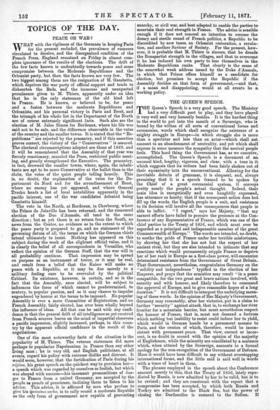TOPICS OF THE DAY.
PEACE OR WAR ?
THAT with the vigilance of the Germans in keeping Paris
for the present secluded, the prevalence of rumours circulated to deceive, and the disorganized condition of the French Press, England remained on Friday in almost com- plete ignorance of the results of the elections. The drift of the few facts known is undoubtedly towards peace and some compromise between the Moderate Republicans and the Orleanist party, but then the facts known are very few. The two biggest among them are the resignation of M. Gambetta, which deprives the war party of official support and tends to dishearten the Reds, and the immense and unexpected prominence given to M. Thiers, apparently under an idea that he is the only statesman of the old kind left in France. He is known, or believed to be, for peace and a fusion between the moderate Republicans and Orleanists, and his personal victory in Paris and Brest, and the triumph of his whole list in the Department of the North are of course extremely significant facts. Such also are the election of M. Jules Simon for Bordeaux, where his life was said not to be safe, and the difference observable in the votes of the country and the smaller towns. It is stated that the " Re- publicans " are rejected by the peasantry, and if this assertion proves correct, the victory of the " Conservatives " is assured. The electoral circumscriptions adopted are those of 1849, and it will be remembered that the Assembly of that year was fiercely reactionary, muzzled the Press, restricted public meet- ing, and greatly strengthened the Executive. The peasantry, in fact, drowned the smaller towns, where, again, the inhabi- tants are apt to be more Conservative at the ballot than in the clubs, the votes of the quiet people telling heavily. This is, no doubt, the explanation of the votes for the De- partement du Nord and for the arrondissement of Brest, where no enemy has yet appeared, and where General Trochu heads a list of local notabilities apparently in the pacific interest, one of the war candidates defeated being Gambetta himself.
The vote in the North, at Bordeaux, in Cherbourg, where the Prince de Joinville has been returned, and the rumoured election of the Due d'Aumale, all tend in the same direction ; but as yet there is no return from the South, no news from the Centre, no evidence as to the extent to which the peace party is prepared to go, and no statement of the governing datum of all, the terms on which the German chiefs intend ultimately to insist. Nothing has appeared on this subject during the week of the slightest official value, and it is clearly the belief of all correspondents in Versailles, who reflect the opinion of the German Staff, that the war will in all probability continue. That impression may be spread on purpose as an instrument of terror, or it may be real, and result from a belief that the Kaiser will make no peace with a Republic, or it may be due merely to a military feeling sure to be overruled by the political Cabinet. Its existence, however, is certain, and so is the fact that the Assembly, once elected, will be subject to influences the force of which cannot be predetermined, to oratory, to popular passion, and as it may chance to impulse engendered by horror at the terms to be imposed. No popular Assembly is ever a mere Committee of Registration, and no French Assembly, fairly elected, has ever been wholly beyond the influence of ideas. All that can be said with any confi- dence is that the general drift of all intelligence as yet received from French sources leaves on the mind of impartial observers a pacific impression, slightly increased, perhaps, in this coun- try by the apparent official confidence in the result of the negotiations. One of the most noteworthy facts of the situation is the popularity of M. Thiers. The veteran statesman did more perhaps to popularize Napoleonism in France than any other living man ; he is very old, and English politicians, at all events, regard his policy with extreme dislike and distrust. It would seem, however, that the fortification of Paris during his regime, his great speech on the quickest way to provision her— a speech which was regarded by ourselves as foolish, but which was obeyed with success—his incessant premonitions of dan- ger to France from a united Germany, are accepted by the people as proofs of prescience, inclining them to listen to his advice. This advice, it is affirmed by men who profess to give his ipsissima verba, is to rally round a moderate Republic as the only form of government now capable of preventing anarchy, or civil war, and best adapted to enable the parties to, ascertain their real strength in France. The advice is sensible enough if it does not conceal an intention to resume the dreary and sterile round of French politics, a Republic to be discredited by new taxes, an Orleanist restoration, a revolu- tion, and another Saviour of Society. For the present, how- ever, it is probable that M. Thiers is sincere, that he dreads the Bonapartist strength in the villages, and that to overcome it he has induced his own party to lose themselves in the Moderate Republican ranks. That clearly is the sense of the somewhat weak address issued by the Duke d'Aumale, in which that Prince offers himself as a candidate for election, but promises to accept the Republic if the Assembly decides on that form of government,—and that, if a mean and disappointing, would at all events be a. working policy.






























 Previous page
Previous page